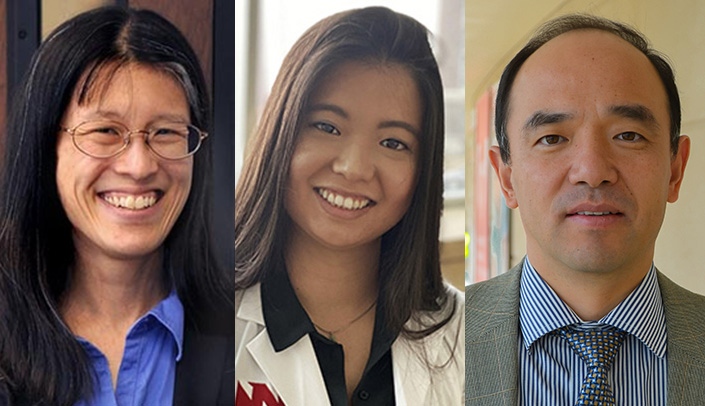When Bo Chao of China arrived in the United States for dental school, she worried about fitting in. Now a third-year student, she has appreciated the kindness and support from her UNMC College of Dentistry family.
“We look different and have different cultural backgrounds, but we are emotionally connected,” she said. “And we all feel stress before finals.”
What can I do?
- Speak out against racism and support one another.
- Be an advocate and an ally.
- Engage in education/awareness.
- Interrupt discrimination when you see it.
- Practice curiosity over judgment.
On May 5, the UNMC and Nebraska Medicine communities gathered online to learn about the experiences and perspectives of the Asian American Pacific Islander (AAPI) community. In celebration of AAPI Heritage Month, Chao and the other panelists shared information, resources and personal experiences of kindness and discrimination.
“All voices need to be heard,” UNMC Chancellor Jeffrey P. Gold, MD, said in welcoming the Zoom audience of nearly 120 individuals. “The med center is a community of people who care for each other in a nonjudgmental way.”
Panelists Linda Huynh, a first-year MD/PhD student and M1 class president in the College of Medicine, and Yun Saksena, DMD, associate dean for education in the College of Dentistry, encouraged participants to continue conversations toward a more inclusive environment. “We sometimes feel invisible because all Asians are lumped together,” Dr. Saksena said. “Asians represent close to 50 countries; we have to look at each group.”
Panelist Dejun Su, PhD, director of the Center for Reducing Health Disparities in UNMC’s College of Public Health, cited a 2020 Pew Research Center study in which four out of 10 U.S. adults said it had become more common for people to express racist views toward Asians since the pandemic began. “This is a long journey, despite what we already have accomplished,” Dr. Su said, urging the audience to create a system where every voice and person has equal opportunity.
Panelist Sharon Ishii-Jordan, PhD, former associate dean of the Creighton University College of Arts and Sciences and a professor emerita of education at Creighton, provided an historical context, which spanned both the discrimination and contributions of Asian Americans. And she referenced her own family’s experience with the 1942 Executive Order 9066, which forced Japanese Americans into internment campus.
Hate is learned, Dr. Ishii-Jordan said; it is not a birth trait. “We need to interrupt discrimination when we see it happening,” she said.
The May 5 event was sponsored by the AAPI Inclusion Task Force, UNMC Office of Inclusion and Nebraska Medicine. Learn more about the Asian American Pacific Islander community at UNMC and Nebraska Medicine.
